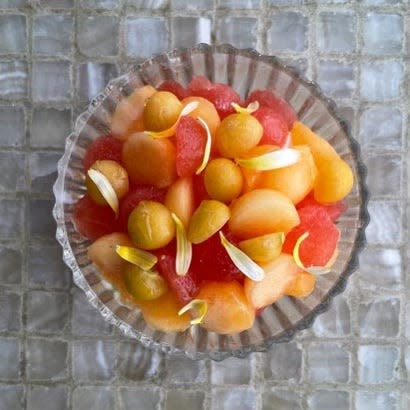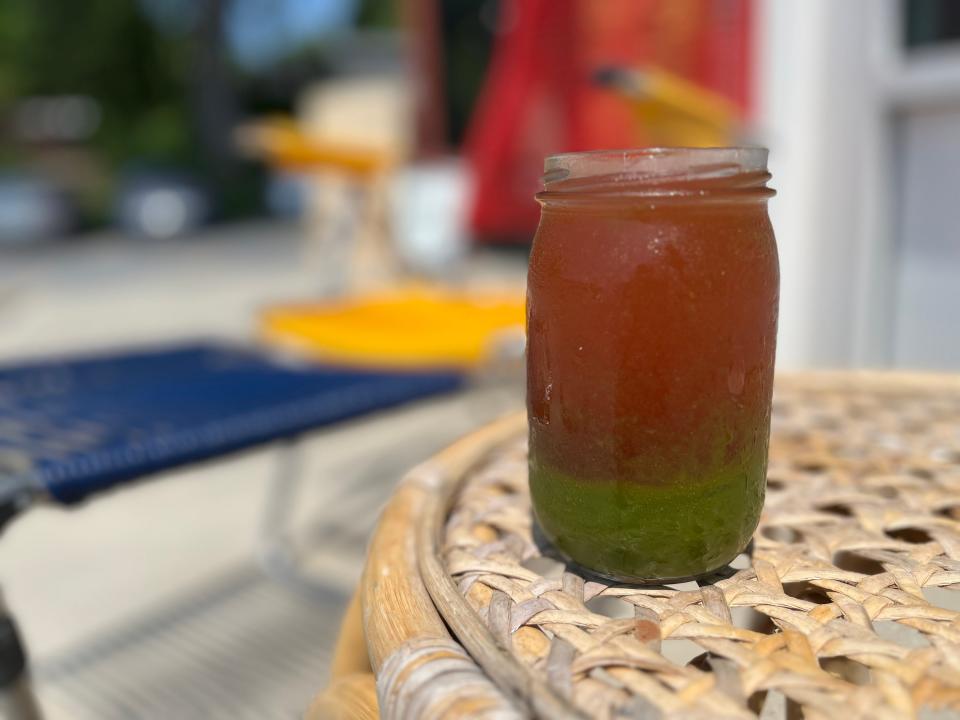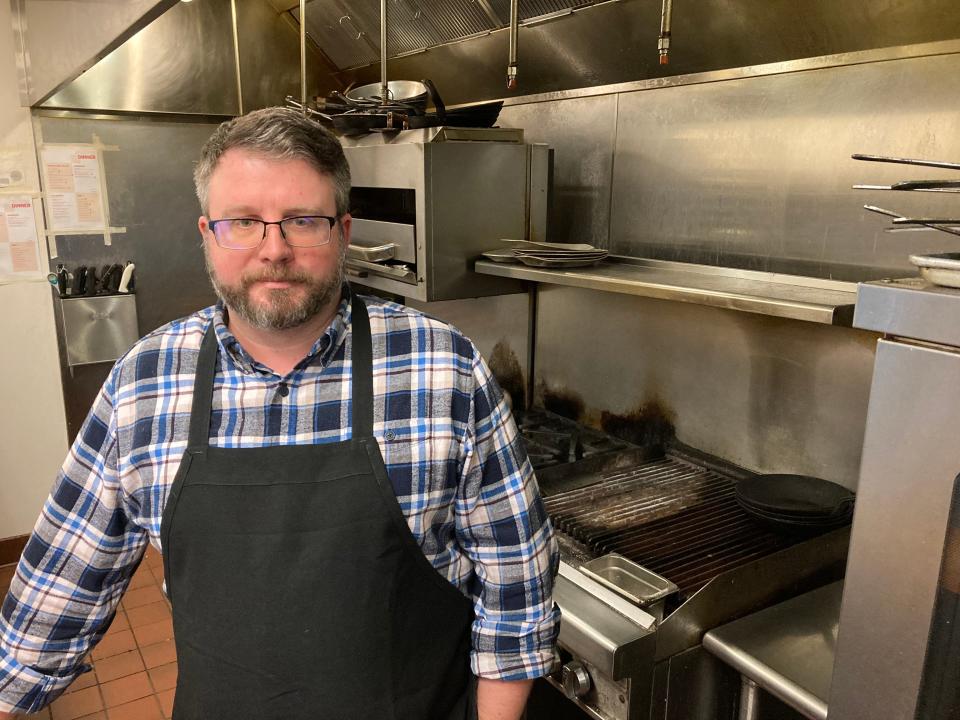Restaurants that rely on local farms cope with aftermath of July floods, May freeze
One of the coolest things about dining out in Burlington is you’ll likely find yourself eating something grown and harvested just a few miles down the road. July’s floods, however, left chefs like Doug Paine going further to get their produce.
“We had to shift some of our vegetable purchasing to other parts of the state. Mostly with salad greens,” Paine said. He is the executive chef for Westport Hospitality Group which includes Juniper Bar and Restaurant and Bleu Northeast Kitchen in Burlington.
Farms and farmers are having a devastating season that began back in May, when a late-spring freeze one night had temperatures drop to 20 degrees. A historically rainy summer followed, perpetually dousing farms, completely inundating some in the July floods.
More: Vermont farmers suffer millions of dollars in losses, and counting, from July floods
“There’s all these other farmers who are having really bad seasons of struggling, but they come in and they’re like, it’s hard for me to complain because I didn’t have 100% crop loss," Amanda Wildermuth, pastry chef at Burlington's Honey Road and Grey Jay cafe, said. "That being the benchmark for the season just shows how devastating this is.”

Salad greens have been particularly hard to come by for restaurants, because even farmers who weren’t inundated with flood waters are having a tough season due to weather, with greens in particular taking a hit.
Who's got the greens?
Greens are tender produce. They have a hard time withstanding perpetual rain. They are a short crop, lasting only a few weeks. Perpetual rain damages leaves, causes them to mold and increases the spread of disease among crops.
Footprint Farms dealt with a huge increase in leafy green demand in the week following the flood, said co-owner and farmer Jake Mendell. Their farm, located in Starksboro, wasn’t wiped out by floods, though their summer season hasn’t been without challenge.
“I think we in part were able to fill it all. Maybe somebody that doesn’t normally order 20 pounds of salad mix, or doesn’t order salad mix at all and then orders a huge amount – there were some people I had to just say ‘no’ to. For the most part we just do it first come first serve,” Mendell said.
Salad greens are a short crop. Footprint farms plants every week, since there is only a 2-3 week window where they can be harvested without being bitter, Mendell said. He and Paine agree the worst of the scramble for salad greens should be over. Even the brief lapse in rainy days, giving enough days for leaves to dry, will have an impact on what’s available, Mendell said.
In doling out greens, Mendell prioritized restaurants with which they had had long-standing existing relationships when demand began overwhelming their supply.
Peachy keen?

Wildermuth often creates desserts based on what Honey Road and Grey Jays’ farm partners offer in abundance, returning to old favorites and creating new things.
Though she loves peaches, she won’t be eating much of them this summer – let alone using them in her desserts. Peaches are one summer fruit you won’t experience in bounty, due to May's hard freeze.
More: Vermont orchards and vineyards devastated by late-May freeze: 'So powerless to protect it'
“You won’t see peaches at all on our menu this year. Since there’s basically just no peach crop available this year – that was one of the most affected crops – we just won’t have them on our menu this year,” Wildermuth said.

Instead, Wildermuth focuses on highlighting the local produce that is available. Appearing on the menu this week at Honey Road is coconut semifreddo with local melon from Pomykala Farm, the bountiful local melon being star of the show.
Restaurants look to farms on higher ground

Many restaurants, including Tomgirl Juice Co., Misery Loves Company and Juniper Bar and Restaurant all within the Greater Burlington, experienced a scramble in forging relationships quickly with local farms to find produce after their farm suppliers were devastated by floods.
Farms in the Intervale in the Winooski River flood plains were hit particularly hard. Farms, such as Pitchfork Farm, which supplies nearly 30 restaurants with produce, faced 100% crop loss leaving restaurants to get produce elsewhere.
Tomgirl Juice Co., offering much more than just juice, gets an abundance from Pitchfork Farm and partners with the Intervale Food Hub, which offers wholesale produce supply to community members, as well as storage space for businesses. Tomgirl has begun storing larger smoothie packs comprised of fresh produce at the Intervale Food Hub following the shut down of its retail operations program.
“We feel really connected to that community and are just trying to support them for the rest of the season and going forward,” Tomgirl General Manager Kelsey Cahill said.
More: Flooded fields leave Vermont farmers with major crop loss
Cahill said that losing their produce definitely changes how the juice operation will source items on their menu, which changes seasonally and is mostly fruits and veggies. For the time being, they are working to strike up conversations with farms in highland areas, using what they can get from Greene Mountain Harvest – a hydroponic greens farm in Waitsfield – and working more with Black River Produce, a statewide fresh produce distributor that partners with over 600 farms in Vermont

Tomgirl Juice Co., like many other restaurants, are still prioritizing local produce, buying what they can from farms to support the tough season they are having.
“It has definitely made the vegetable market tighter and I know a lot of farms are focusing on higher revenue, direct farmers market sales instead of focusing on wholesale quite as much,” Paine said.

Strength in relationships
VT Fresh Network, is a non-profit organization founded with the mission to advance relationships between farmers, chefs and producers. The network began trying to connect overflows of produce with restaurants following the floods, as some farms completed bountiful preemptive harvests, which then could find homes in restaurants, said Tara Pereira, executive director of Vermont Fresh Network.
The strength of these relationships shines in crisis, as witnessed during the pandemic and through the summer’s weather.
“For farms that haven’t necessarily been completely decimated or for restaurants that are still open and serving their communities, that connection, that linkage becomes really important in emergency response when it comes to feeding people,” Jake Claro, director of VT Farm to Plate, said.
Vermont Agency of Agriculture survey
The Vermont Agency of Agriculture, Food and Markets is surveying farms, agricultural businesses, service and non-profit organizations to begin obtaining data on damages suffered from July 7 to July 18. Preliminary data was gathered after the survey was open for 15 days and garnered 205 responses.
From the 205 responses, the agency found that 38% of respondents experienced loss of crops meant for wholesale or retail markets – the highest percentage of losses recorded from respondents so far. There was a 35% recorded loss of crops meant for animal feed. Average annual income lost was reported at 30%.
This survey data doesn’t take into account the damages suffered from May’s hard freeze, which mainly jeopardized stone and orchard fruits. Impacts of this are just now becoming evident and will become more prominent in the fall's apple harvest.
Contact Kate Sadoff at ksadoff@gannett.com.
This article originally appeared on Burlington Free Press: Farm-to-table restaurants cope with flood induced supply chain issues

